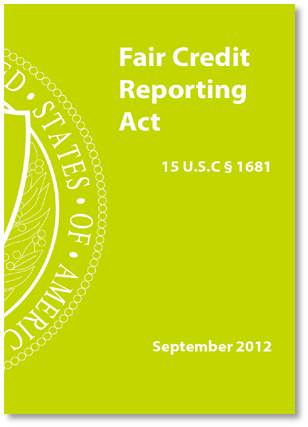Need to verify an applicant's employment or income history? Checking to see if a candidate has a criminal history or civil judgments?
If you get information from a company that compiles it so you can make eligibility determinations, you must comply with the Fair Credit Reporting Act (FCRA). That means no double-dipping. If you get a consumer report for one purpose, don’t use it for a different purpose.
 The FCRA applies when you use consumer reports to determine things like eligibility or pricing for credit, insurance, or housing; eligibility for employment, government benefits, licenses, membership in an organization; or admission to an educational institution.
The FCRA applies when you use consumer reports to determine things like eligibility or pricing for credit, insurance, or housing; eligibility for employment, government benefits, licenses, membership in an organization; or admission to an educational institution.
If you use consumer reports to make eligibility decisions, make sure you review the Notice to Users of Consumer Reports. Consumer reporting agencies (CRAs) are required to give you this document to inform you of your obligations under the FCRA. Other federal or local laws also may apply to your use of consumer reports.
When you get a consumer report, you must certify to the CRA the purpose for which you will use it. You must use the report only for that purpose. For example, that means if you get a report for a membership determination, you can’t then use it to make a credit decision. Or if you get a report to determine eligibility for a government benefit, you can’t then give it to a different government agency to make another eligibility determination.
Why is this important? When consumers request copies of their files, CRAs must inform them about who has obtained reports on them. This helps consumers track each organization that has used a consumer report to make an eligibility decision about them.
Getting a new consumer report when you have a new purpose helps your business ensure that you obtain the most current information about the consumer.
When using consumer reports, here are a few more FCRA principles to keep in mind:
- If you make a negative decision about a person based on a consumer report, you must provide the person with notice of the decision – an “adverse action notice” including the name, address, and phone number of the CRA that prepared the report, a statement that the CRA did not make the decision and is not able to provide the reasons for the adverse action, and that the person has a right to receive a free copy of the report within 60 days and dispute inaccurate information.
- The adverse action notice may be provided orally, electronically, or in writing. A written adverse action notice is best because it provides proof of compliance. The CRA that provided you with the consumer report may have a model adverse action notice.
- Finished with the report? Once you no longer need it, you must securely dispose of the report and any information gathered from it.
